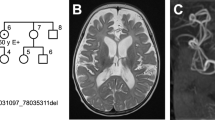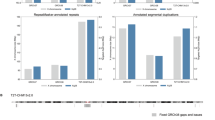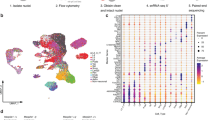Abstract
Xq28 duplications including MECP2 are a well-known cause of severe mental retardation in males with seizures, muscular hypotonia, progressive spasticity, poor speech and recurrent infections that often lead to early death. Female carriers usually show a normal intellectual performance due to skewed X-inactivation (XCI). We report on two female patients with a de novo MECP2 duplication associated with moderate mental retardation. In both patients, the de novo duplication occurred on the paternal allele, and both patients show a random XCI, which can be assumed as the triggering factor for the phenotype. Furthermore, we describe the phenotype that might be restricted to unspecific mild-to -moderate mental retardation with neurological features in early adulthood.
Similar content being viewed by others

Log in or create a free account to read this content
Gain free access to this article, as well as selected content from this journal and more on nature.com
or
References
Rett A : Ueber ein eigenartiges hirnatrophisches Syndrom bei Hyperammoniamie in Kindesalter. Wien Med Wschr 1966; 116: 723–738.
Rett A : Cerebral atrophy associated with hyperammonaemia; in Vinken PJ, Bruyn GW (eds): Handbook of Clinical Neurology. Amsterdam: Elsevier, 1977, Vol 29, pp 305–329.
Amir RE, Van den Veyver IB, Wan M, Tran CQ, Francke U, Zoghbi HY : Rett syndrome is caused by mutations in X-linked MECP2, encoding methyl-CpG-binding protein 2. Nat Genet 1999; 23: 185–188.
Lubs H, Abidi F, Bier JAB et al: XLMR syndrome characterized by multiple respiratory infections, hypertelorism, severe CNS deterioration and early death localizes to distal Xq28. Am J Med Genet 1999; 85: 243–248.
Meins M, Lehmann J, Gerresheim F et al: Submicroscopic duplication in Xq28 causes increased expression of the MECP2 gene in a boy with severe mental retardation and features of Rett syndrome. (Letter). J Med Genet 2005; 42: e12.
Van Esch H, Bauters M, Ignatius J et al: Duplication of the MECP2 region is a frequent cause of severe mental retardation and progressive neurological symptoms in males. Am J Hum Genet 2005; 77: 442–453.
Bartsch O, Gebauer K, Lechno S et al: Four unrelated patients with Lubs X-linked mental retardation syndrome and different Xq28 duplications. Am J Med Genet A 2010; 152A: 305–312.
Friez MJ, Jones JR, Clarkson K et al: Recurrent infections, hypotonia, and mental retardation caused by duplication of MECP2 and adjacent region in Xq28. Pediatrics 2006; 118: e1687–e1695.
Vandewalle J, Van Esch H, Govaerts K et al: Dosage-dependent severity of the phenotype in patients with mental retardation due to a recurrent copy-number gain at Xq28 mediated by an unusual recombination. Am J Hum Genet 2009; 85: 809–822.
Ramocki MB, Peters SU, Tavyev YJ et al: Autism and other neuropsychiatric symptoms are prevalent in individuals with MeCP2 duplication syndrome. Ann Neurol 2009; 66: 771–782.
Reardon W, Donoghue V, Murphy AM et al: Progressive cerebellar degenerative changes in the severe mental retardation syndrome caused by duplication of MECP2 and adjacent loci on Xq28. Eur J Pediatr 2010; 169: 941–949.
Makrythanasis P, Moix I, Gimelli S et al: De novo duplication of MECP2 in a girl with mental retardation and no obvious dysmorphic features. Clin Genet 2010; 78: 175–180.
Allen RC, Zoghbi HY, Moseley AB, Rosenblatt HM, Belmont JW : Methylation of HpaII and HhaI sites near the polymorphic CAG repeat in the human androgen-receptor gene correlates with X chromosome inactivation. Am J Hum Genet 1992; 51: 1229–1239.
Lichter P, Cremer T : Chromosome analysis by non-isotopic in situ hybridization; in Roonie DE, Czepulkowski BH (eds): Human Cytogenetics – A Practical Approach. Oxford: Karger, 1992, pp 157–192.
Nguyen HP, Riess A, Krüger M et al: Mosaic Trisomy 21/Monosomy 21 in a living female infant. Cytogenet Genome Res 2009; 125: 26–32.
McMullan DJ, Bonin M, Hehir-Kwa JY et al: Molecular karyotyping of patients with unexplained mental retardation by SNP-arrays: a multicenter study. Hum Mutat 2009; 30: 1082–1092.
Felder B, Radlwimmer B, Benner A et al: FARP2, HDLBP and PASK are downregulated in a patient with autism and 2q37.3 deletion syndrome. Am J Med Genet A 2009; 149A: 952–959.
Clayton-Smith J, Walters S, Hobson E et al: Xq28 duplication presenting with intestinal and bladder dysfunction and a distinctive facial appearance. Eur J Hum Genet 2009; 17: 434–443.
Acknowledgements
This study would not have been possible without the invaluable assistance of the patients and their families. We wish to thank the cooperating physicians for referral of the patients to our departments, especially G Dissemond, L Kämmerling and V Horber. We also thank Bernhard Horsthemke, André Reis and Olaf Riess for continuous support, as well as Juliane Hoyer and Markus Zweier for their essential help. The Institutes for Human Genetics, Essen, Erlangen, Heidelberg and Tübingen, Germany, are members of the ‘German Mental Retardation Network’ (MRNET), which is funded by the German Federal Ministry of Education and Research (BMBF) as a part of the National Genome Research Network (http://www.ngfn.de/en/retardierung.html, project reference numbers 01GS08164, 01GS0816, 01GS08168, 01GS08162).
Author information
Authors and Affiliations
Corresponding author
Ethics declarations
Competing interests
The authors declare no conflict of interest.
Rights and permissions
About this article
Cite this article
Grasshoff, U., Bonin, M., Goehring, I. et al. De novo MECP2 duplication in two females with random X-inactivation and moderate mental retardation. Eur J Hum Genet 19, 507–512 (2011). https://doi.org/10.1038/ejhg.2010.226
Received:
Revised:
Accepted:
Published:
Issue date:
DOI: https://doi.org/10.1038/ejhg.2010.226
Keywords
This article is cited by
-
IRAK1 Duplication in MECP2 Duplication Syndrome Does Not Increase Canonical NF-κB–Induced Inflammation
Journal of Clinical Immunology (2023)
-
A brief history of MECP2 duplication syndrome: 20-years of clinical understanding
Orphanet Journal of Rare Diseases (2022)
-
Methylation status of genes escaping from X-chromosome inactivation in patients with X-chromosome rearrangements
Clinical Epigenetics (2021)
-
A new sex-specific underlying mechanism for female schizophrenia: accelerated skewed X chromosome inactivation
Biology of Sex Differences (2020)
-
A sibship with duplication of Xq28 inherited from the mother; genomic characterization and clinical outcomes
BMC Medical Genetics (2017)


